7-19-09
Mapping Wah Do Dem:
By Diane Sippl
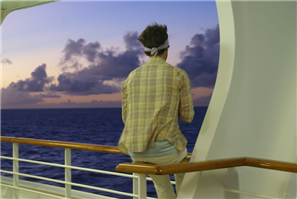
We can’t afford four more years of the same tried old theory that says we should give more and more to the millionaires and billionaires and hope that prosperity trickles down on everybody else. That’s the failed theory that got us into this mess.
— Barack Obama, campaign speech
Hear the words of the Rastaman say:
“
Say one bright morning when my work is over,
Man will fly away home.
At the 2009 Los Angeles Film Festival, filmmaking partners Sam Fleischner and Ben Chace wowed audiences and jury members alike with the world premiere of Wah Do Dem, racking up the Target Filmmaker Award for Best Narrative Feature (with $50,000 cash attached). The Jury observed that this debut feature was a film that “could feel anecdotal, but through its musical shifts and tone and its vision of the world as a newly optimistic place, Wah Do Dem creates a strong and profound emotional narrative.” What follows is in appreciation of the filmmakers’ well-earned recognition and their impressive collaboration with a hard-working and inspired filmmaking collective.
Bluesy News Wah Do
Dem is a light-hearted study in contrasts, at first between young Brookyn
hipsters and leisure-class seniors, and then between haves and have-nots, with
one of the hipsters poised precariously in-between for comic irony and a moment
of enlightenment that could last a lifetime.
Chance falls upon Max (Sean Bones), who is as blessed with Caribbean
cruise tickets he won in a raffle as he is easily spurned and dumped by weepy
Willow (Norah Jones, of My Blueberry
Nights and “Don’t Know Why I Didn’t Call” fame). “
Monsieur Hulot in Obamaland Fleischner’s dynamic camera cruises the boat itself. Its interior balconies and winding staircases are lined with hoards of cocktailers decked out in black-tie garb for five tiers of “Guantanamera” jazz, faux art auctions, disco dancing, and loners (Kevin Brewersdorf) on the prowl for “gym-boys.” The ship’s exterior houses multiple waterways, and in one scene, the camera’s quasi-surreal point of view floats fluidly from the Jacuzzi to the pool to its underwater swimmers to the sea itself, wryly shoring up the redundancies in a steady stream of turquoise. Max holes up in his room, where he finds online stats that tell him 97% of Jamaicans are for Obama in this mid-election moment. Inspired, he dons a beat-style ice cream suit and goes onshore to play the slot machines, only to find himself back on board explaining how his “cruising partner bailed” on him, accompaniment courtesy of a Nordstrom-style pianist. He’s an earnest but forlorn Tati sans sight gags. But the tide turns as Max ventures out again, and this spoof on luxury liners fast becomes a road movie by car, minibus, rowboat, foot, and bike in the picaresque tradition gone humoresque, with all the mockery, parody, and situational reversals that come with the territory.

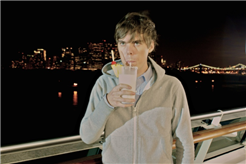
Rude Boy Goes Native Now
in his T-shirt and sunglasses, Max heads from the ATM to the jerk stands looking
for local brew. Five island cabbies
descend upon him, and then the first of a string of locals who all mirror Max’s
new self-image. A skipping, hopping
trickster in a Calypso hat and the same aqua shades Max wears only five times
as big, spins around Max, begging, “Just one dance!” Another local whisks him off to “
“All Is One” …may be written on the side of a building, but when Max, now a barefoot, bare-chested pauper without a passport, approaches two American tourists for help, they give him ten bucks and a T-shirt they just bought, scanning and shunning him as one more homeless pariah. But the locals give him a free bus ride, and the guys on the street give him shoes so he can play soccer with them — until he sees the bus “go an’ left him.” He’s stranded yet again, but the guys take him to a bar to hang out, where the breaking news on CNN Live is “Obama Wins Ohio,” and with that and the victory, the girls are jumping on him front and back to dance. An African-American President — it’s a broad stride, but not broad enough to cross the water that washed out the road with the floods after a footballer gives him a bike ride. A local “celebrity” switching between calls on his cell, from patois with his agent to love talk with his girl, hollers for a boatman to ferry Max to the other side.
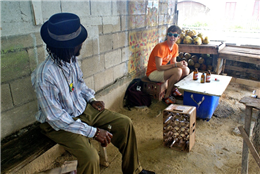
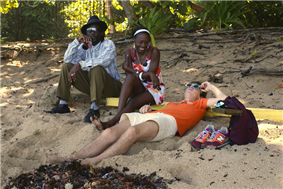
In the Name of a Goddess Carl
Bradshaw, a walking archive of Rasta movie roles, is there to meet him. “I been
waitin’ for you for a long time… I’ll show you the way.” He refers to Obama as
“sunshine — mankind for change.” A
subjective camera bobs with them through a jungle of palms, a hillside of corn,
groves of orange trees, the man’s house, and right up through a hole in the
roof. The old, red-eyed sage has the
counseling Max needs — “Sometimes material leave you. Rain destroy my palace… I rise on the fall of things… Reach out to the end of the world without
movin’. Stand still yet goin’
everywhere.” They fry up fish the man
caught. Max retires and the screen turns
black, yet in another somewhat surreal scene, his bedside candle takes him
across the water in the dark to the cadence of the drums that summon him. It’s just Max and his reflection under the
full silver moon. He finds eight
musicians in a binghi session and sits by their bonfire as the soulful
Don’t Forget Me Throughout
the film, whenever Max “gets down” and swoons over Jamaicans at their “roots,” he’s
upended by the contradictions that rear their ugly heads. There is one last character who puts it to
him straight:
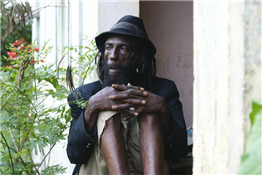
What They Do Wah Do Dem is a striking and playful
romp on a
In the broad sense, Chace and Fleischner wrote, directed, and shot their film “on the fly” — that is, while they had a good 40+ (their reports vary) pages of scenarios they clearly wanted to include, shooting the film themselves with hand-held cameras and natural light allowed them to be very mobile and to improvise with their actors, whether American or local, seasoned or new. The two filmmakers started with the notion of documenting the people they wanted to show us, in the scenes that they normally inhabit, with a rather Bressonian respect for natural life and people’s inherent values. This led to experimentation, especially in dialogue and acting — to honing a lyrical style that coincided with the musical core of the film and the culture the filmmakers sought to portray, incorporating a rotation of improvised performances in the native tongue that mime the “repeater” drums in a Nyabinghi grounation. Finally came the storytelling, of natural and social “mishaps” endemic to a postcolonial country that fittingly befall the tourist protagonist, a narration that evolved mostly in a long winter of the filmmakers’ editing thereafter.
All in all, from that Caribbean
cruise for two that Ben Chace actually did win in a raffle came the filmmaking
venture for two that Sam Fleishner proposed to him upon his return from
shooting a film in
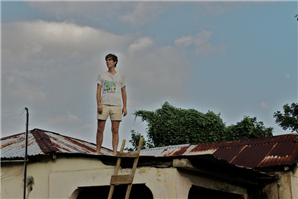
That Touch of Tati It’s
worth a note that footballer-turned-tourist Max, unwitting purveyor of the wrath of
Pictures at an Exhibition, Rasta-Style The centuries-old cliché of “going native” in cinema, literature, and cultural lore from travelogues to autobiographies finds an unabashed simplicity in Wah Do Dem that is far from simplistic, mainly because its heart is in the right place and its humility is about all that is not left to chance. Chace and Fleischner are acute observers and avid listeners; yet these skills require more than training. A social imagination is also at stake, and fortunately, these new filmmakers have both the modesty and the passion to open themselves to cultural difference and shared respect. With the same healthy curiosity, they explore the rhythms and harmonies of their arts (photography, music, directing of actors, editing), expanding them by integrating them into a new cinematic language reminiscent of a filmmaker as surprisingly lyrical as Jacques Tati and a collective as mesmerizingly spiritual as The Congos.
What Goes Around Comes Around Wah Do Dem is a celebration of life, its
politics embedded in a bravely creative mode of production and an open
sensibility that derive directly from the film’s themes of salvation,
transcendence, and revelation of the human soul. Chance (raffle tickets for two when Ben Chace
was watching Buster Keaton on an outdoor screen with Bill Frisell playing a
live score), trance (the meditative power of a Rasta chant), and circumstance
(America’s first black President) may have led this team to etch a lovable
character far more possessed by Queen Nyabinghi and her immortal comeuppance than
a weeping Willow, but it’s sheer imagination, talent, and hard work (not to mention nerve and
savvy) that have allowed Chace and Fleischner to “make the
music” of their film. They aim now to
project it in a traveling outdoor cinema in
Wah Do Dem
Directors: Sam
Fleischner and Ben Chace; Producers: Sam Fleischner, Katina Hubbard, Ben Chace,
Martha Lapham, Henry Kasdon; Screenplay: Sam Fleischner and Ben Chace (with the
actors); Cinematography: Sam Fleischner; Sound: Kevin Brewersdorf; Editors: Sam
Fleischner and Ben Chace; Music: The
Cast: Sean
“Bones” Sullivan, Norah Jones, Ira Wolf-Tuton, Kevin Brewersdorf, Patrick
Morrison, Sheena Irons, Carl Bradshaw, The
Color, HDCam, 73 minutes. In English and Jamaican patois with English subtitles.